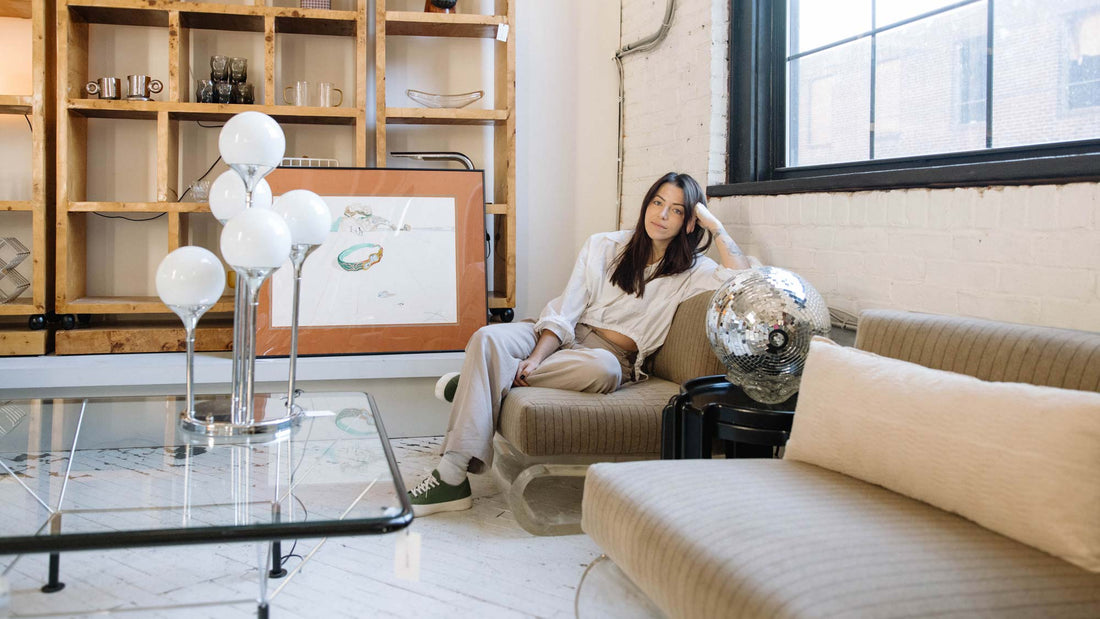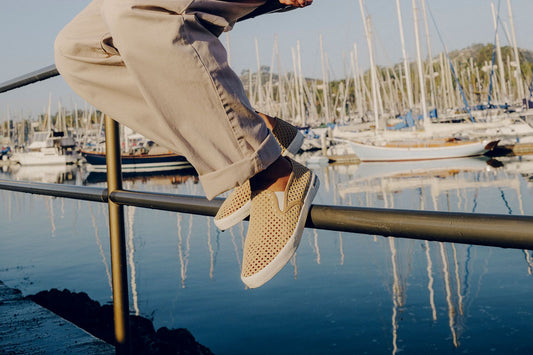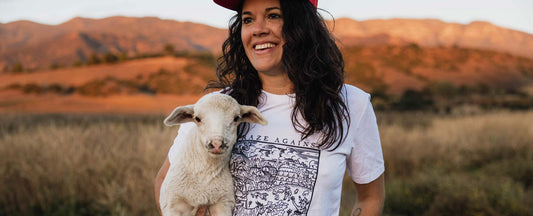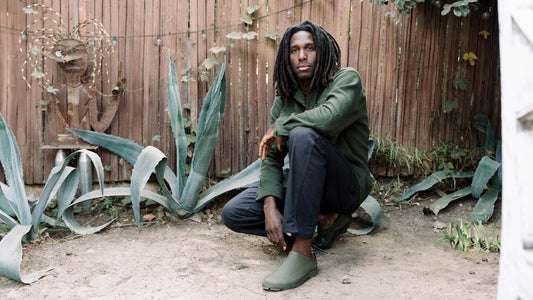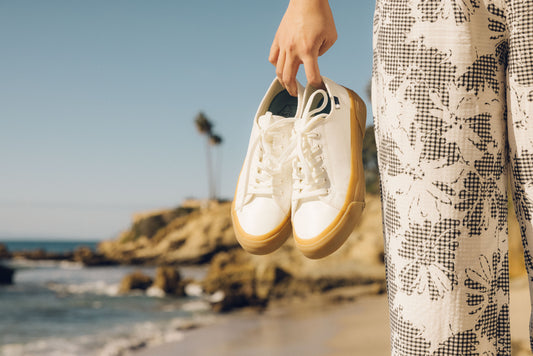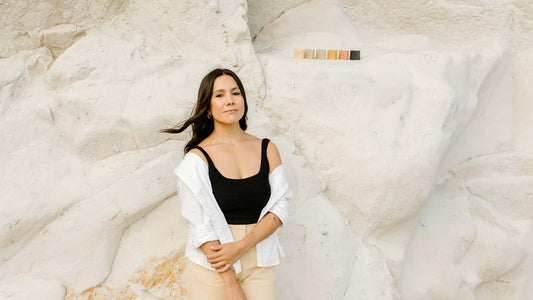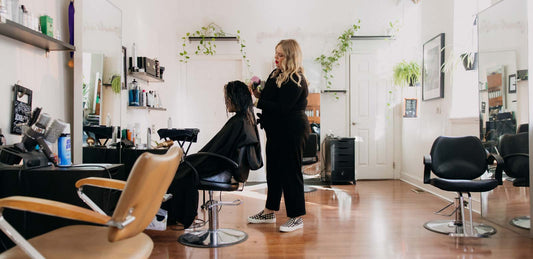The street outside Betsu Studio is still shrugging off the quiet of the early morning hour when owner Laura Weiszer unlocks the door to her showroom. She swings open the tall second-story windows as a construction worker shuffles by below, styrofoam Dunkin’ coffee cup in hand. With that, a bird flies inside, finding a perch in the rafters—right above two rows of freshly reupholstered vintage chairs. “Huh,” says Laura, craning her neck. “Well, that’s never happened before. I guess I’ll be Googling how to remove bird shit from velvet later.”
There’s always something to learn at Betsu Studio, Weiszer’s industrial warehouse space on the outskirts of Philadelphia where she restores and sells retro and gently-used objects, mainly from the second half of the 20th century. Dealing vintage wares wasn’t the path Weiszer intended to follow after graduating with a BFA in illustration, but sometimes it’s the thing you can’t stop doing in your spare time that becomes your full-time. “You’d think I’d have my own home pretty dialed after all these years, but I’m always redecorating,” Weizer laughs. “My poor cat. He’s probably like, ‘Help me! What are all these new smells all the time?”
As told to SeaVees. Photography by Johnie Gall.


“I was working as an editorial illustrator and procrastinating working on my assignments when I started shopping at flea markets. I’d find a piece of furniture that needed to be refurbished, bring it home, work on it, get bored with it, change it and sell it. An illustrator named Jessica Hische had come to our school one time while I was still in college and had given a speech where she said the work you do when you’re procrastinating is the work you should be doing for the rest of your life. And that really stuck with me because I remember having this thought while I was working on my thesis that I couldn’t do anything else even if I wanted to. Illustration was all I knew how to do. I wasn’t trained in anything else so it felt like, ‘Okay, well, I guess this is it.’
In 2017, my roommate and I had started accumulating so much stuff that we decided to open an Etsy shop and sell some of it. We staged our spare bedroom with a chair, rug and plant stand and listed it all online. I had so much fun shooting the pieces and coming up with the creative copywriting, and it just started rolling from there. We ended up going out looking for stuff specifically to resell, and eventually moved into our garage space so we wouldn't have to carry furniture upstairs anymore.
“She said the work you do when you’re procrastinating is the work you should be doing for the rest of your life.”
I wanted the shop’s name to not really mean a specific thing to English speakers. I’d just gotten back from a sourcing trip in Japan and I’d found the word Betsu, which I loved because it meant “an alternative”—or so I thought. I found out later it doesn’t really translate the exact same way [laughs], like when someone gets a tattoo in another language and it just means ‘ketchup’ or something. I think it actually means to split a check or a separate stomach for sweets. But I love that it has so many meanings.


By the next year we’d moved into this industrial studio space and had decided to just do furniture rentals. My roommate worked in film and we’d collaborated on set design for different commercials and films where we found ourselves sampling from our own garage studio. We thought there was probably a business in renting out furniture, but what we didn’t realize was that the film industry in Philly was slow that year and the bread and butter for that kind of business is actually events, in which case you need to have a lot of the same style chair or table. The rental business became a lot of work with very little enjoyment, and by the end of that year my roommate told me he wanted to step back and focus on production design. I was left asking myself, ‘Shit, is this for real? Am I going to be the sole person responsible for keeping this going? Is this even what I want to do?’
Turns out the rental business wasn’t the answer. What I loved was going out and finding stuff to fix and get rid of, over and over again. When I see something that sparks any kind of emotion in me or there’s craftsmanship I can really appreciate, I’m like ‘You’re coming home with me.’ For a while, postmodern style was something I bought a lot. Even now, I have colleagues who sell vintage and if anything super ‘80s comes in they’ll send it to me because it’s ‘so Betsu.’ But now we have midcentury, art deco, contemporary stuff from local artists—as long as I like everything, it’ll be cohesive in some way. I definitely don’t always make the right call when I bring something home. I have a chair in my car right now that as I was loading I was like, ‘Why the hell did I buy this?’


Pricing is tricky. We make an effort to mix high and low. Like, we have chairs listed around $100, which is what you might find at IKEA, and then I’ll have a chair that’s $2,600 because it’s really special and you’d literally never find it at IKEA. It’s a weird feeling having people come visit the showroom from one city and tell me, ‘Oh, everything is so affordable, this lamp is so cheap’ because I’ll also have someone from my city come in and be like, ‘What the hell? $700 for a lamp?’ And honestly, I feel that. When I started, I didn’t have any capital, I didn’t take out a loan, I didn’t get help from anyone. I basically furnished my entire apartment from the Craigslist 'curb alert' section.
I remember finding a beautiful walnut and rosewood credenza, going online and seeing the same one selling for $1,200 and being like ‘That’s ridiculous, I'm going to list it for $300.’ It wasn’t long before I realized that if I wanted Betsu to be a viable business, I had to reconsider the value of not just the pieces I was curating but my effort, too. The reality is, the market will always dictate value. That $300 credenza sold in a matter of minutes, and so did the $700 lamp. The market is changing and costs have increased dramatically in the short time we've been in business, but I'll always strive to be on the more affordable end of vintage whenever I can. I started Betsu to share the shit that makes me happy, and that goes beyond commerce. The creativity and genuine passion for design runs deep and I think it shows.


I read a book recently that was talking about how if you love baking, you shouldn’t open a bakery. Go to a bakery and be a baker there, because opening a business of your own means you’re doing all the other tasks and not the baking itself. I wasn’t exposed to entrepreneurship growing up so had no idea how much would go into owning a business, how much responsibility I'd have to take on and how many roles I'd have to fill. It’s always been hard for me to ask for help and one of the biggest challenges I've faced has been growing a team and people management.
The first few people I hired didn’t stay very long because I was always either micromanaging or not checking in enough. There was a turning point where I realized this was a skill I needed to learn, so I went from listening to podcasts about design to audiobooks about business and leadership. It doesn’t come as naturally to me as, say, decorating a room, and I still don’t have it 100% right, but I’ve gotten more comfortable with bringing in the right people who I can trust to make smart decisions, which is a huge step.
“The dream is to wake up every day and be intentional with how I’m going to spend my time.”
I was never very goal-driven or future-oriented. I’ve always been someone who likes to live in the moment and be present every single day and I think that is still the dream. If anything, that dream is even more relevant because it’s becoming harder to achieve with running a business and having to plan a year, two years, three years down the road. I love envisioning all of the possibilities and being able to create the future I want, but the dream is to wake up every day and be intentional with how I’m going to spend my time.


Thanks to my team and the systems we’ve created, the retail aspect of Betsu doesn’t solely depend on me and I’m able to spend time applying my knowledge and expertise to designing spaces people live and work in. My love for interiors has always been the driving force of the business and I've been fortunate to start working on projects in the field recently. I helped design my fiance’s restaurant, Middle Child Clubhouse, and right now I’m working on designing and decorating a brewery and a couple of private residences. Everyday looks different, and I wouldn’t want it any other way.
I don’t think I have imposter syndrome anymore and I’m proud of that because it’s something I struggled with for a long time. I remember I’d get on these “best of” lists and tell myself it wasn’t a legit award if I was awarded one, which is kind of a sad way of thinking. But I don’t feel that way anymore.
“There’s no right or wrong way to live a life or go about achieving the things you dream about, so be wary of anyone who is trying to tell you the best way to do something.”
My dream for others is that they feel confident going against the grain, whether that’s choosing a fuchsia and orange patterned couch that would never be allowed inside a West Elm store, or choosing a career that makes no sense to anyone else. But honestly, my best advice is to not listen to anyone else’s advice [laughs]. There’s no right or wrong way to live a life or go about achieving the things you dream about, so be wary of anyone who is trying to tell you the best way to do something. That, and don’t get too attached to a piece of furniture if you don’t like it anymore. Throw a “for sale” sticker on it and go get something you love.”
Laura wears the Women’s Monterey Sneaker Platform in Cactus.

